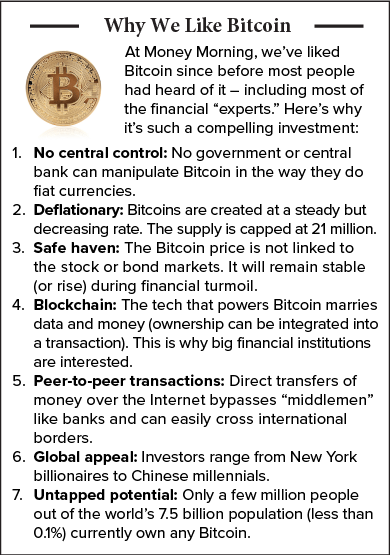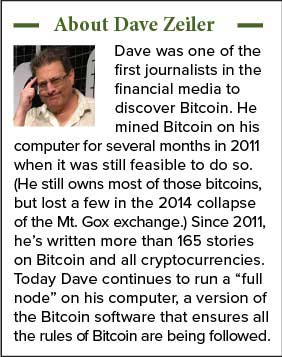Bitcoin investors are now face to face with not just one Bitcoin hard fork, but two of them.
Less than three months ago (on Aug. 1), yet another Bitcoin hard fork took place - the one that created Bitcoin Cash.

The Bitcoin Gold hard fork is happening today (Monday), although the developers say the public won't have access to their coins until Nov. 1. Bitcoin's SegWit2x hard fork is expected on or around Nov. 18.
Let's be frank: It's not an ideal situation...
Bitcoin hard forks should be rare and, ideally, done with the consent of nearly all of the community. But as Bitcoin has grown, so have the opinions on how to move forward.
For average users, Bitcoin hard forks have consequences regardless of whether one supports or opposes them.
This Bitcoin hard fork guide has several goals. First, you'll find out why these Bitcoin hard forks are happening and how they work. You'll also learn about opportunities to profit while avoiding pitfalls that could cost you.
Why Are There So Many Bitcoin Hard Forks?
The main reason for the Bitcoin hard forks is the so-called "Bitcoin civil war." That was a fight within the Bitcoin community over the best way to change the code to accommodate the rising number of transactions. As it stood, the Bitcoin network was beginning to see backlogs that delayed transaction confirmations and caused transaction fees to rise.
One faction believed the best answer was to increase the size of the blocks from one megabyte to eight megabytes. The bigger blocks allow for many more transactions per block, relieving the congestion. This group backed the Bitcoin Cash hard fork.
Another faction preferred a change to the code called "SegWit," which squeezes more transactions into each block. This group dislikes bigger blocks because it will make the blockchain grow faster, limiting the number of users who can run the full nodes that verify transactions and "police" the network. The Bitcoin blockchain is currently about 137 gigabytes; one megabyte blocks limit the growth to about 50 gigabytes per year.

The main Bitcoin chain adopted SegWit in August following the Bitcoin Cash hard fork. Bitcoin Cash supporters consider SegWit a dangerous change to the code and a betrayal of the original vision of Bitcoin creator Satoshi Nakamoto.
The reason for the SegWit2x fork is that the 2x part - intended to increase the block size to two megabytes - did not occur at the time the SegWit part was activated.
The idea was to move the entire original Bitcoin blockchain from one-megabyte blocks to two-megabyte blocks, but many in the Bitcoin community object to the 2x change for the same reason they object to Bitcoin Cash (and because they'd rather not have yet another competing version of Bitcoin).
Bitcoin Gold came about because some members of the community have become concerned about the concentration of Bitcoin mining power among a shrinking number of big miners, most of whom are based in China. Decentralization is a vital feature, intended to make it impossible for any entity or group to control Bitcoin.
Bitcoin Gold intends to increase the number of miners by making it resistant to the powerful, expensive ASIC machines that sprung up in 2013. Instead, the Bitcoin Gold algorithm will allow mining by high-end graphics cards in PCs.
Unlike the other Bitcoin hard forks, Bitcoin Gold is a "friendly" fork. The intent is not to supplant the original Bitcoin chain, but to serve as an insurance policy in case the current miners gain too much control and start to act against the interests of the larger community.
What Is a "Hard Fork" Anyway?
A hard fork is a split of a cryptocurrency into two separate cryptocurrencies that share a common history prior to the fork. The mechanism of the split is a change in the cryptocurrency's software code. After the hard fork, each "branch" of the cryptocurrency follows different rules.
This is what happened with Bitcoin Cash. After Aug. 1, Bitcoin Cash became a separate cryptocurrency. It trades on the exchanges under a different symbol (BCH) than the original Bitcoin (BTC).
Will the Hard Fork Affect Other Cryptocurrencies?
No, only Bitcoin. If you own Ethereum, Litecoin, or any other cryptocurrencies, the upcoming Bitcoin hard forks will have no impact on your holdings. There was a recent Ethereum hard fork, but the whole community agreed to move to the new "Byzantium" version, as it is viewed by all as a desirable upgrade.
Even Bitcoin Cash is not affected, since it became a different cryptocurrency after its hard fork.
Can I Get "Free Money" from a Bitcoin Hard Fork?
Yes. Anyone who holds Bitcoin at the time of a hard fork receives an equal amount of the newly created cryptocurrency. That's what will happen with Bitcoin Gold and the SegWit2x hard forks.
So if you have 10 bitcoins, you will end up with 10 Bitcoin Gold coins, 10 SegWit2x coins, and your original 10 bitcoins. Sounds great, right?
But then it gets complicated.
Those who keep their bitcoins in wallets on their PCs, in hardware wallets, or in paper wallets have access to their private keys. A Bitcoin owner can use those private keys with a wallet designed for the new cryptocurrency to access their "free" coins.
Urgent: Executive Editor Bill Patalon just saw something on his precious metals charts he's only seen twice in 20 years. He calls it the "Halley's Comet of investing" - and it could lead to windfall profits. Read more...
Those who have their bitcoins stored at one of the exchanges may or may not get access to the new cryptocurrency. Some may never support the coins created by the upcoming hard forks.
Right now, Bitcoin exchange policies are all over the map. Most seem willing to at least grant access to the newly created coins, even if they decide against adding either to their roster of trading cryptocurrencies. If Bitcoin Gold and/or the SegWit2x Bitcoin variant achieve a stable network, more exchanges will consider supporting them.
Just know that these policies will vary widely. Following the Bitcoin Cash hard fork, people who held their Bitcoin at the Bittrex exchange had access to their BCH (and could trade it for other cryptocurrencies) within a day of the fork. Coinbase customers, on the other hand, are still waiting for their Bitcoin Cash, which the company expects to make available Jan. 1.
What Will These Forked Cryptocurrencies Be Worth?
While the exact prices of Bitcoin forks are impossible to predict, we can make some ballpark estimates. Bitcoin Cash started off trading in the $200 to $400 range, then briefly shot up to nearly $1,000. In the weeks since, BCH has gradually fallen toward $300.
Today (Monday), the YoBit exchange started trading Bitcoin Gold futures. As of mid-afternoon, BTG futures were reading at about $400.
Given the desire of many Bitcoin investors to dump forked coins, the Bitcoin Gold price is likely to come under pressure after Nov. 1, when users can access their BTG and trading becomes more widespread.
A SegWit2x price is a tougher call, as that fork is intended to replace the original Bitcoin. Its price will depend on how much support it gets from the community, particularly from the miners. But at first, the SegWit2x price will likely fall in the same $200 to $500 range where the other forked coins have traded.
So, What Should I Do?
[mmpazkzone name="in-story" network="9794" site="307044" id="137008" type="4"]
Unless you really know what you're doing (and even if you do), the best course of action during these hard forks will be to keep your bitcoins in a safe location where you control them (a wallet on your PC, a paper wallet, or a hardware wallet) and wait it out.
With the viability of these hard forks unclear, waiting and watching is the most practical approach.
Remember, the priority is keeping your original bitcoins safe no matter what happens with the hard forks.
It will be tempting to try to claim the "free" cryptocurrency as quickly as possible, but it's just risky.
What Makes It Risky?
Unless robust protections are put in place, there's a chance that trying to move or sell the newly created coins will make your original bitcoins vulnerable to a "replay attack."
Because the two versions of Bitcoin share a common history and common addresses, a bad actor could "replay" a transaction made on one chain on the other chain. So the recipient would get the same amount of both versions of Bitcoin.
The Bitcoin Gold team says it will have replay protection in place, but the SegWit2x team has resisted. Replay protection would make existing Bitcoin wallets incompatible with SegWit2x, a problem for a group that wants to supplant the original Bitcoin.
Beyond that, users need to be extremely careful about the addresses they use to send the different versions of Bitcoin created via hard forks.

Many people have lost Bitcoin by sending it to a Bitcoin Cash address, or vice versa. Although the addresses look exactly the same, they are not interchangeable. Sending Bitcoin to an improper address means it not only doesn't get to its destination - it's lost forever.
Adding two more versions of Bitcoin increases this risk. The only good news is that the Bitcoin Gold team has said it wants to adopt a different address format in a future release to reduce confusion.
Scammers are looking to take advantage of the confusion and the desire to "cash out" as well.
Websites already have sprung up offering to split off Bitcoin Gold coins. But they ask for your private keys, which gives the scammers access to your original Bitcoin in addition to any cryptocurrency created by hard forks. Giving out your private keys is like handing a criminal the keys to your car.
Finally, there's a very distant chance that either SegWit2x or Bitcoin Gold will eventually gain enough support to become the primary version of Bitcoin. In that case, holding on to all of the newly created coins assures you won't lose regardless of how things play out.
How Can I Protect Myself After the Forks?
While holding on to your bitcoins will keep them safe through both forks, at some point you'll want to move, spend, or sell some of them.
If one or both hard forks fail to implement replay protection, users can protect their bitcoins by moving them from the wallet where they're currently stored to another wallet you control. A replay attack on this transaction won't matter, as you are the recipient - all moved coins end up in your possession.
After that, you'll be safe from future replay attacks because the moved coins will have a new address created after the hard fork (it won't be an address shared in common with the other versions.)
What About Taxes?
Unfortunately, the IRS hasn't been very clear about the tax liabilities incurred from hard forks.
Some tax experts believe the IRS will consider the money taxable when you receive it, regardless of whether you sell or even attempt to access it.
So, a person who held 10 bitcoins on Aug. 1 and received 10 Bitcoin Cash coins would owe tax on their value at the time they were received - about $300 apiece. The same will go for Bitcoin Gold and SegWit2x.
On the other hand, the IRS may decide that you don't owe taxes on the new coins until you trade them for other cryptocurrencies or sell them for fiat money, such as U.S. dollars. Both constitute what the IRS calls a "taxable event."
The IRS might issue guidance on this before tax season, but investors may be on their own.
Skipping on Bitcoin taxes even if you sell the forked coins will likely prove unwise. The IRS is working hard to get more information on investors who own and trade cryptocurrencies. The risk of getting caught is higher than many realize. My advice: Comply as best you can.
Up Next: Rare Gold Anomaly
Money Morning Executive Editor Bill Patalon just caught something on his gold charts that he's only seen twice in the past 20 years. A $13 billion gold anomaly he calls the "Halley's Comet of investing."
It's very rare, and fleeting, and Bill sees things lining up perfectly to bring some very sizeable precious metal profits to well-positioned investors.
Click here to check out his research...
Follow me on Twitter @DavidGZeiler and Money Morning on Twitter @moneymorning, Facebook, or LinkedIn.
About the Author
David Zeiler, Associate Editor for Money Morning at Money Map Press, has been a journalist for more than 35 years, including 18 spent at The Baltimore Sun. He has worked as a writer, editor, and page designer at different times in his career. He's interviewed a number of well-known personalities - ranging from punk rock icon Joey Ramone to Apple Inc. co-founder Steve Wozniak.
Over the course of his journalistic career, Dave has covered many diverse subjects. Since arriving at Money Morning in 2011, he has focused primarily on technology. He's an expert on both Apple and cryptocurrencies. He started writing about Apple for The Sun in the mid-1990s, and had an Apple blog on The Sun's web site from 2007-2009. Dave's been writing about Bitcoin since 2011 - long before most people had even heard of it. He even mined it for a short time.
Dave has a BA in English and Mass Communications from Loyola University Maryland.



